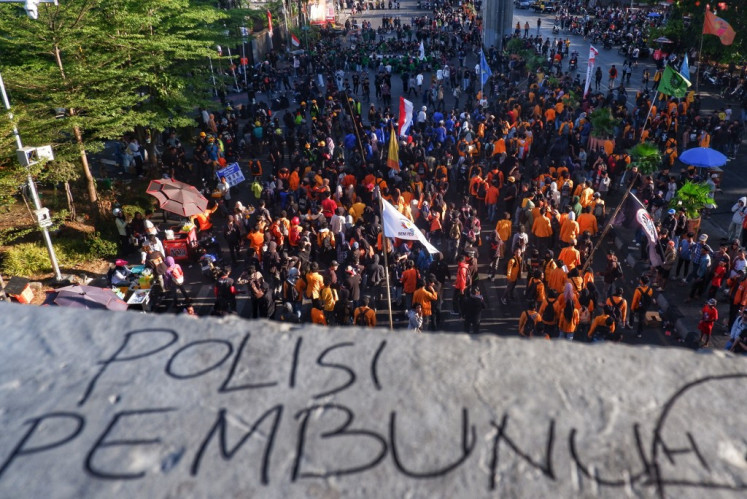Popular Reads
Top Results
Can't find what you're looking for?
View all search resultsPopular Reads
Top Results
Can't find what you're looking for?
View all search resultsSurakarta relies on S. Korea for bus rapid transit system
The Surakarta city administration in Central Java has been assessing cooperation with South Korea as it aims to provide eight more corridors for the Batik Solo Trans (BST) mass rapid transit system in the city
Change text size
Gift Premium Articles
to Anyone
T
he Surakarta city administration in Central Java has been assessing cooperation with South Korea as it aims to provide eight more corridors for the Batik Solo Trans (BST) mass rapid transit system in the city.
South Korea was chosen because the country is renowned for its mass transportation system.
'Talks with South Korea are 75 percent complete,' Surakarta Transportation Communication and Information Agency head Yosca Herman Soedradjad said on Wednesday.
Yosca said the involvement of South Korea brought hope for the completion of the eight additional BST corridors, which required at least Rp 180 billion (US$14.74 million) to be completed.
There are only two corridors operating with 16 buses each.
Corridor I links Kartasura with Palur through Jl. Slamet Riyadi and is managed by state bus operator Perum Damri.
Corridor II also links Kartasura and Palur but through Balapan railway station. This corridor is operated by the BST consortium.
The planned eight corridors will need some 175 buses and 270 bus stops to operate.
Ideally, each corridor should be served by 20-25 buses.
Yosca said the South Korean investor had agreed to provide funds for the buses, shelters as well as the required information technology for each corridor.
The investor, according to Yosca, was interested in the project partly because it was to be operated by the private consortium under the umbrella of PT Batik Solo Trans.
'With the foreign investor, we've used a cooperation system,' Yosca said.
He gave assurances that the consortium would manage Corridors II'VIII, while Perum Damri would manage Corridors I, IX and X.
He said the arrangement was considered important because it was related to the concessions to be given to the South Korean investor.
Despite optimism the talks would be a success, the city administration would still monitor the Rp 70 billion promised by the National Development Planning Board (Bappenas) for the BST development.
'The fund will hopefully be disbursed in 2014 so our target of operating all BST corridors by 2015 can be realized,' Surakarta Mayor FX Hadi Rudyatmo said.
The eight additional corridors for the rapid transit buses operating in Surakarta are considered urgent as they are predicted to be able to reduce traffic jams in the city, which have reached up to 50 percent of available space.
Each of the eight corridors will have 15 to 25 buses to operate, thus the intervals of operating buses can be minimized to around seven minutes from the current 30 minutes due to the limited number of buses in operation.
'With 16 buses operating, the time interval can be seven-and-a-half minutes at the maximum because the time needed to pass through a corridor is about an hour,' PT BST director Farida Wardhatul Jannah said.










